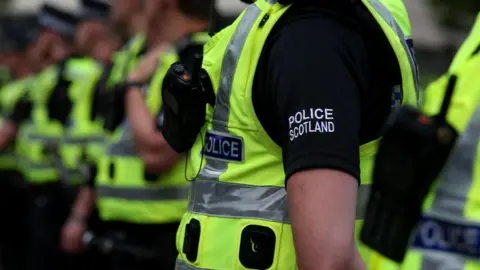Man charged under Terrorism Act over Palestine Action poster
 PA Media
PA MediaA man has been charged under the Terrorism Act after allegedly displaying a poster in his window expressing support for the banned organisation Palestine Action.
Police Scotland have confirmed the 38-year-old was arrested in Glasgow on Wednesday.
A spokesperson said he was charged in connection with an offence under the Terrorism Act 2000 for displaying the poster at a property in the Shawlands area of the city.
The force said the man is due to appear in court a later date and a report is being submitted to the Procurator Fiscal.
Earlier this month, Palestine Action was proscribed by the UK Government under the Terrorism Act 2000, meaning membership of or expressing support for the group is now a criminal offence.
About 100 people have since been arrested at protests against the move in London, Manchester and Cardiff.
The group was outlawed after claiming responsibility after two Voyager aircraft were sprayed with paint inside RAF Brize Norton in June.
The government said the group had a long history of criminal damage, with its activities increasing in frequency and severity.
TRNSMT arrest
A man was charged on Saturday outside the TRNSMT music festival in Glasgow for wearing a T-shirt bearing the message "Genocide in Palestine Time to Take Action."
The words "Palestine" and "action" were in larger typeface than the rest of the text.
Police Scotland said the 55-year-old had been charged in connection with an offence under the Terrorism Act, for wearing a T-shirt expressing support for a proscribed organisation.
T-shirts with the message have been produced by the Scottish Palestine Solidarity Campaign.
In a post on Facebook, the campaign said one of its Glasgow members had been "charged at the roadside" at TRNSMT and the T-shirt had been confiscated.
At the time of the ban, Home Secretary Yvette Cooper said the government would "not tolerate" those who put the UK's national security "at risk."
The group tried unsuccessfully to block the move in court, with its lawyer arguing that the ban would constitute an "authoritarian abuse" of power.
